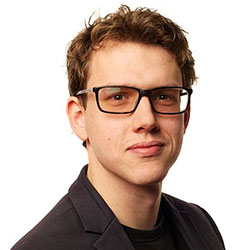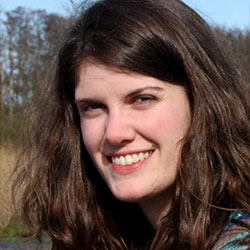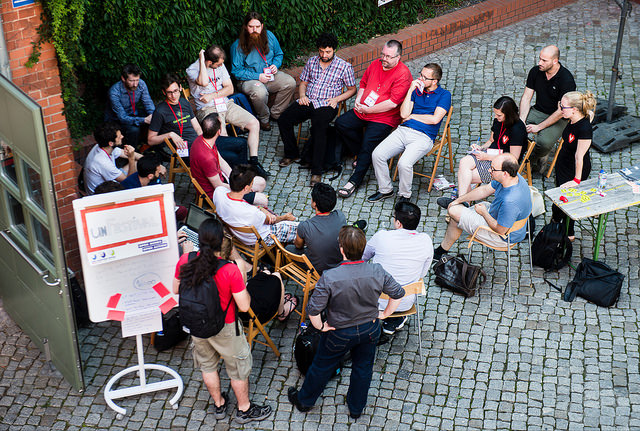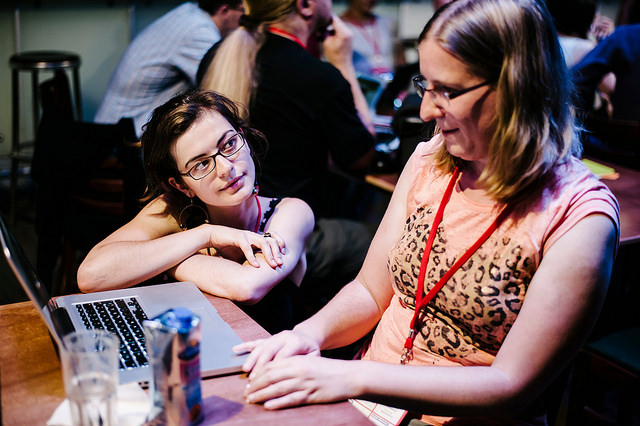What You Did
Communities
Open knowledge communities gather at OKFestival to tackle the complex challenges they are wrestling with and to gain a mutual understanding of what they have done, where they are and what the future holds for their community.

Joris Pekel

Jenny Molloy
We spoke with Joris Pekel, the Community Coordinator for Cultural Heritage at Europeana, and Jenny Molloy,a Zoology researcher at the University of Oxford, about bringing communities together to collaborate at OKFestival. Both serve as volunteer working group coordinators of the OpenGLAM and Open Science working group respectively and worked tirelessly to ensure that the OpenGLAM and Open Science communities were able to make effective use of rare in person time at the festival to overcome challenges, develop new initiatives and come together as a community – Here is what we learned!
The beauty of the open knowledge community is that there is truly something for everyone and at OKFestival, if you are a civil servant, a data wrangler, a scientist or a librarian, there is something for you! Two open knowledge communities that contributed significantly to this year’s festival were the Open Science and OpenGLAM - Galleries, Libraries, Archives and Museums –communities, each organising a number of sessions and fringe events over the course of the week. Open Science and OpenGLAM are two of the largest Open Knowledge working groups. Both groups actively discuss their respective fields over mailing lists and during online monthly sessions in addition to taking advantage of Open Knowledge events to come together in person to work through challenging issues, foster new partnerships and strengthen their shared mission.
OpenGLAM: ensuring the public domain is alive and well
The OpenGLAM community members, including the OpenGLAM working group coordinator, Joris Pekel, were involved in a number of sessions at OKFestival, some focused on specific community projects such as the public domain calculators and the OpenGLAM benchmark survey and others designed to resolve difficult questions the community had been wrestling with. One such session, organised by Joris Pekel of Europeana and Paul Keller of the Dutch think-tank Kennisland, was about maintaining a healthy and thriving public domain. The session was designed to explore essential questions around originality and copyright when digitising analogue works. The world’s rich cultural heritage is largely analogue and while digitization can make public domain works more accessible to everyone, one of the primary goals of the OpenGLAM community, individuals and organisations have at times claimed copyright on the digitised work even when the work itself is in the public domain. This issue was raised within the working group back in January 2014 and although the group debated the issues over calls and the mailing list, they struggled to determine what their position should be.

Outdoor unFestival session. Pic by Gregor Fischer.
They decided to use OKFestival to bring people together to try to come up with some recommendations. During the session itself, Paul Keller introduced the challenge by bringing together a number of arguments and case studies weighing the pros and the cons of the policies held by cultural institutions around the digitisation of public domain works and copyright. Europeana is taking the resulting recommendations into account as they develop a publication policy for data providers. While the discussion is delicate and certainly on-going, OKFestival provided the OpenGLAM community and some of the most prominent actors in the space the opportunity to come together to collaboratively work through these difficult questions. According to Joris, OKFestival allows groups the opportunity to organise these type of hand-on, outcome oriented sessions and recognises that “there’s no other event we could use to do such a thing”.
Open Science builds the case for itself
Similarly, the open science community took advantage of OKFestival to organise a number of sessions and fringe events with the goal of deliberate and work through some of the pressing issues the space is facing, to run workshop around specific projects and initiatives and to garner a better understanding about where they are as movement.

Photo by GGregor Fischer.
One challenge in particular that that the Open Science working group attempted to tackle this year was how to build an evidenced based case for open science. The session facilitators were:
particularly interesting in mobilising the expertise of the working group to move forward with research on open science and answering the questions that will help us to advocate for it [open science].
While there is anecdotal evidence that open science can be more efficient than traditional science, this has never been systematically tested. As such, the group organised a workshop OKFestival to kick-off the discussion and ultimately develop a framework that could be used to demonstrate the conditions under which open science is more efficient and put open science to the test. Ultimately, the session was a great success, the outputs of which formed the basis for a follow up workshop organised by the open science local group in Brazil. Again, this is an on-going challenge that could not be solved in a one hour festival session but the community was able to develop a basis for a framework, an outcome made possible by OKFestival.
We were keen to be the convenor of a global gathering, welcoming participants from all around the world and from different open knowledge communities in order to overcome roadblocks and strengthen our shared vision. Over the course of a week, the OpenGLAM and Open Science communities succeeded in creating a basis for resolving complex challenges and strengthened their shared understanding of what’s next for their respective communities.